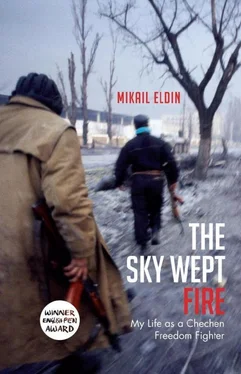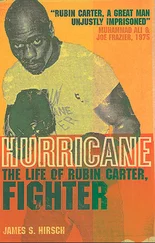‘When did they come in? By which route?’
‘They came this morning at dawn, down the Staropromys-lovskoye Highway, from that side,’ the soldier said. Neither he nor I paused to reflect on the absurdity of my question: after all, there had plainly been no tanks in the city the day before. The information given by the soldier did not worry me unduly. In 1993, the opposition had also entered a district of Grozny, but they had left without a fight. We continued our conversation.
‘Are they far from here?’
‘They’re in Druzhba Narodov Square.’
Reassured by this information, I headed off down the avenue, past the gutted tanks, making for the square.
‘Hey, don’t go that way! The road’s under fire, they’re not far,’ the soldier hollered at me.
‘But you told me they’re in Druzhba Narodov Square.’ I replied, puzzled.
‘That’s right, they’re in the square. But that’s not far from here.’
‘Well, I’ve got to get there.’
‘Why?’ he asked, suspiciously.
‘For work.’
‘Work, today? Look, go on home.’
‘But I’m a journalist.’
‘Oh, I see… Well, take the street running parallel, if you must.’
He most likely rated my chances of survival as nil, yet all the same didn’t want to watch me die from sheer folly. I was excited that my profession would give me something interesting to reminisce about in old age – oh, silly and naïve thoughts! – and decided to follow this kindly advice. I walked past bewildered civilians who were flocking around the gruffly rumbling tanks.
‘What are you doing out here?’ I couldn’t resist asking.
Two young guys smiled at me awkwardly and shrugged. ‘We heard the blasts and came over to find out what was happening. Well, it looked pretty serious and we decided to stay,’ they said, as though explaining themselves to me.
With them were a number of women, some with children, who were stranded on this side of the city.
‘Young man, who are you?’ an elderly man asked me.
‘He’s a journalist,’ the soldier answered on my behalf.
‘Well, if you’re a journalist, then you’ll know. These attackers – are they Russian or Chechen?’
‘What’s the difference?’ I replied. ‘What matters is they’re shooting.’
‘Maybe you can’t see it, but there’s a massive difference!’ The old man spoke crossly. ‘See, I’ve got my son here in the National Guard,’ he added, somewhat more gently. ‘I came to get him, but he’s refusing to leave. Says he doesn’t want to desert his comrades. Well, I can understand that. But I’m not going to let him shoot at fellow Chechens,’ he said firmly.
‘Of course, I understand. But I actually don’t know,’ I tried to explain.
‘You’re a journalist, and you don’t even know who’s shooting?’ he responded, his tone implying that he was quite sure Presidents Yeltsin and Dudayev reported their plans daily to journalists in general, and to me in particular.
‘No, listen. I don’t know,’ I mumbled, shaken by his persistence. People around us began smiling. ‘But the tank crews were Russian!’ I offered.
‘Yes?’ His face brightened. ‘Well, if they’re Russians, then let him fight. And if he chickens out, I’ll ruddy well kill him myself.’
At this point, one of the fighters began swearing blind to the old man that the soldiers in the tanks were Russian, and I went on my way. I was still under the illusion that this wasn’t genuine military engagement – I hadn’t heard any small-arms fire yet – but merely the same old sabre-rattling we’d seen before. And it wasn’t just me: most people failed to grasp the full gravity of what was unfolding. On that first day and later too, when things were quiet again, you could hear people discussing the assault excitedly.
‘If it’s the Russians starting a war, then more fool them. After all, the Chechens are hardly going to start killing each other.’
‘Just you wait, those opposition soldiers will take their weapons and go over to the Chechen side.’
‘In fact, I bet some of them only enlisted so they could arm themselves at Russia’s expense.’
Seeing this naïve faith of ordinary Chechens in the Chechen sense of national consciousness and comradeship made me well up with a feeling of pride and pity for them. All too soon, though, events would shatter their illusions with terrifying speed. Just as they had in the Caucasian War more than a century earlier, Chechens would take up arms to serve their enemies. Chechens would serve their enemies as mountain guides; Chechens would serve in law enforcement; they would even create a state, complete with all its institutions, and hold mock elections, although there would also be cases of opposition soldiers, sometimes entire units, switching sides and joining the resistance. But in the early days naïve convictions held enormous sway, and people treated the activity of the occasional pro-Moscow armed group as an exception. For a long time we stubbornly refused to believe that the Chechen spiritual world had imploded at the moment when, for the first time in modern history, ordinary Chechens took up weapons against their fellow Chechens. And when we finally accepted the blunt truth, we ended up losing countless lives, and many of the living would lose what was most precious of all: their Chechen spirit.
But at that time, early in the morning of 26 November, I walked down Rosa Luxemburg Street in the direction of Druzhba Narodov Square truly thrilled at my luck. Before long I was stopped by some armed men who were taking up positions calmly, confidently and soberly. Their commanding officer walked up to me and asked where I was going. I explained that I needed to ‘cross over to the other side’.
‘Why do you need to?’ he asked with interest.
‘I’m a journalist. I want to interview them. I’ve already interviewed your side.’
I had not actually interviewed their side, but then there was no need. After all, the motives of the defending side were plain enough. They were defending because they had been attacked. Well, that was their job. What interested me was the motive of the attackers. The commander looked over my papers, and, satisfied I was telling the truth, said, ‘Of course you’re just doing your job, but we’re going to start shooting soon and you could get hit by a stray bullet. And you do realize their side could kill you? They’ll see you as one of Dudayev’s journalists.’
‘A journalist cannot belong to Dudayev, or indeed to any side!’ I declared loftily, and he smiled sadly at this. Here I was, trying to pass into enemy territory just as engagement began, yet it is the duty of a commander not to let such things happen.
‘Do you think you could hold your fire until I reach them?’ I asked – a question utterly idiotic in its selfishness.
He looked me in the eye and replied, ‘All right, we’ll wait, only be quick. Will a few minutes be enough?’
‘Oh, yes. I run fast when frightened,’ I quipped, making a sprint for it.
A chorus of laughter followed me. Perhaps they were laughing at my folly: we both knew that if the fighting started, no one would hang around waiting for some unknown journalist to finish running. Yet I needed the commander’s promise for my own peace of mind. There you go, an entire unit is delaying the start of the battle just for me . All the same, I ran as fast as my legs could carry me. When I caught sight of a group of armed men, I stopped and said hello. They said hello back.
‘Who are you?’ I asked, noting the white bands on their sleeves.
‘We’re the opposition. Who are you?’
‘I’m a journalist. I want to interview your commander.’
A stocky soldier leapt forward and pointed his assault rifle at me: ‘We don’t recognize journalists. You’ve all sold out to Dudayev! Get out of here while you can!’ he shouted.
Читать дальше












